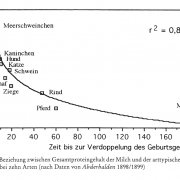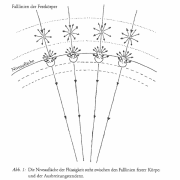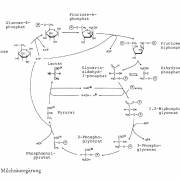-
 Elemente der Naturwissenschaft2002,2002Zur Biochemie der Milch von Tier und Mensch Proteine, Lipide und Kohlenhydrate der Milch in ihrem biologischen Kontext Daniel Braun Summary The article reviews and extends interspecific correlations between the main components of milk of different mammalian species and certain aspects of their biology. Proteins are correlated with... read more
Elemente der Naturwissenschaft2002,2002Zur Biochemie der Milch von Tier und Mensch Proteine, Lipide und Kohlenhydrate der Milch in ihrem biologischen Kontext Daniel Braun Summary The article reviews and extends interspecific correlations between the main components of milk of different mammalian species and certain aspects of their biology. Proteins are correlated with... read more -
Elemente der Naturwissenschaft2002,2002Auf dem Weg zu einer natürlichen Ordnung der Pflanzensubstanzen Klaus Frisch Introduction Towards the end of his life Goethe expressed the hope that one day it would be possible to understand the chemical processes of a plant in a way just as satisfying as the one he had achieved at the morphological level (Kuhn 1988). In retrospect, one... read more
-
Elemente der Naturwissenschaft2002,2002Die Rationalität der Chemie Peter Janich Summary Despite the very important role of chemistry in technology, civilisation and shaping our view of the world it has been neglected by philosophy and the humanities. For several reasons, it cannot be regarded as an appendix to physics and treated as such in the theory of science. Several... read more
-
 Elemente der Naturwissenschaft2002,2002Handeln aus Ideen Armin Scheffler Summary One reason for investigating medicinal plants is that it gives hints from empirical experience about their therapeutic effects. It is generally believed that this experience is obtained by chance. Thus deducing therapeutic effects from exact observation of the plant, including its specific... read more
Elemente der Naturwissenschaft2002,2002Handeln aus Ideen Armin Scheffler Summary One reason for investigating medicinal plants is that it gives hints from empirical experience about their therapeutic effects. It is generally believed that this experience is obtained by chance. Thus deducing therapeutic effects from exact observation of the plant, including its specific... read more -
 Elemente der Naturwissenschaft76,2002ELEMENTE DER NATURWISSENSCHAFT 76 1/2002 Zur Entstehung der Farben Die Erkenntniswege des «Goetheanismus» und der «modernen Physik» Thomas Schmidt Summary Through investigating the relation between light and colour, Goethe’s method of natural science is applied to the ”gestures of ideas” of modern research in physics. In section 1... read more
Elemente der Naturwissenschaft76,2002ELEMENTE DER NATURWISSENSCHAFT 76 1/2002 Zur Entstehung der Farben Die Erkenntniswege des «Goetheanismus» und der «modernen Physik» Thomas Schmidt Summary Through investigating the relation between light and colour, Goethe’s method of natural science is applied to the ”gestures of ideas” of modern research in physics. In section 1... read more -
 Elemente der Naturwissenschaft2002,2002Die Abfallentsorgung im 20. Jahrhundert Ein Spiegel unseres Umweltbewusstseins Jörn Heinlein Summary This contribution describes how people related to the waste they produce throughout the ages until the present. Undoubtedly the amount of waste that we discard nowadays is unsustainable. This is also due to its chemical properties.... read more
Elemente der Naturwissenschaft2002,2002Die Abfallentsorgung im 20. Jahrhundert Ein Spiegel unseres Umweltbewusstseins Jörn Heinlein Summary This contribution describes how people related to the waste they produce throughout the ages until the present. Undoubtedly the amount of waste that we discard nowadays is unsustainable. This is also due to its chemical properties.... read more -
 Elemente der Naturwissenschaft76,2002ELEMENTE DER NATURWISSENSCHAFT 76 1/2002 Die Grundversuchsanordnungen für die Lichtbeugung an Kanten Hanspeter Seipp Summary The simplest arrangements of edges that give rise to the phenomenon of light diffraction are presented. Especially two of them are of particular importance. They imply two different types of optical imaging and... read more
Elemente der Naturwissenschaft76,2002ELEMENTE DER NATURWISSENSCHAFT 76 1/2002 Die Grundversuchsanordnungen für die Lichtbeugung an Kanten Hanspeter Seipp Summary The simplest arrangements of edges that give rise to the phenomenon of light diffraction are presented. Especially two of them are of particular importance. They imply two different types of optical imaging and... read more -
 Elemente der Naturwissenschaft2002,2002Biogeochemische Stoffkreisläufe des Erdorganismus: Aspekte zur unterschiedlichen Bedeutung der Ozeane und Kontinente Meinhard Simon Summary Intensified research on global biogeochemical cycles in recent decades has led to a holistic concept of the earth, i.e. that it is considered as a self-regulating system, a whole, the biosphere and... read more
Elemente der Naturwissenschaft2002,2002Biogeochemische Stoffkreisläufe des Erdorganismus: Aspekte zur unterschiedlichen Bedeutung der Ozeane und Kontinente Meinhard Simon Summary Intensified research on global biogeochemical cycles in recent decades has led to a holistic concept of the earth, i.e. that it is considered as a self-regulating system, a whole, the biosphere and... read more -
 Elemente der Naturwissenschaft76,2002ELEMENTE DER NATURWISSENSCHAFT 76 1/2002 Bewegung in ihrem Bezug zu den Elementen Anregungen aus dem Zweiten Naturwissenschaftlichen Kurs zur Mechanik Wilfried Sommer Summary Starting from Steiner’s ideas about the elements as developed in his Heat Course, we examine free fall as well as the relation between dynamics and kinematics... read more
Elemente der Naturwissenschaft76,2002ELEMENTE DER NATURWISSENSCHAFT 76 1/2002 Bewegung in ihrem Bezug zu den Elementen Anregungen aus dem Zweiten Naturwissenschaftlichen Kurs zur Mechanik Wilfried Sommer Summary Starting from Steiner’s ideas about the elements as developed in his Heat Course, we examine free fall as well as the relation between dynamics and kinematics... read more -
 Elemente der Naturwissenschaft2002,2002Abbau und Umwandlung bei biochemischen Prozessen am Beispiel der Gärungen Hans-Joachim Strüh und Birgit Jäckel Summary We know from the history of arts and crafts that early experience of ‘practical chemistry’ dates back to very early times. Apart from the production of materials such as metal, glass and clay as well as tanning and dyeing... read more
Elemente der Naturwissenschaft2002,2002Abbau und Umwandlung bei biochemischen Prozessen am Beispiel der Gärungen Hans-Joachim Strüh und Birgit Jäckel Summary We know from the history of arts and crafts that early experience of ‘practical chemistry’ dates back to very early times. Apart from the production of materials such as metal, glass and clay as well as tanning and dyeing... read more